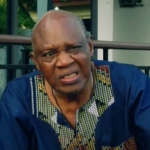
The Ghanaian judiciary’s credibility has come under intense scrutiny from former Supreme Court judge, Justice William Atuguba, who has called for a fundamental restructuring of the institution.
In an exclusive interview on JoyNews’ The Pulse programme, the retired judge articulated a strong position on the need for judicial reforms, a sentiment that has taken on added significance following the recent removal of former Chief Justice Gertrude Torkornoo.
Justice Atuguba revealed that he has been a long-time advocate for judicial reform, even before the 2024 elections.
His calls, however, were often dismissed by some who accused him of political bias.
“I felt that the judiciary needed refinement….Look the trouble in this country is the political element which has permeated through the fabric of Ghanaian society to an extent that objectivity, public interest, sincerity and all these things have been pushed aside by some of the actors in favour of personal interests. Personal interest, yes, an aggrandisement and not the law, personal interest and not the law, so long as it is subverted to advance some people’s interest,” he stated.
“Before the elections [2024], I used to say here that the judiciary needed restructuring,” he further explained. “They said NDC lawyers, yeah, that when he comes, of course, they will state politically that he’s also going to bring NDC. These things don’t help us…”
His comments reflect a deep-seated public perception that the judiciary is not neutral.
A 2024 Afrobarometer survey revealed that a staggering 62% of Ghanaians have little to no trust in the courts, a sharp increase from 30% in 2005. This growing mistrust, according to the report, is largely driven by the perception that court rulings often favour the executive branch of government.
Justice Atuguba stressed that the loss of public confidence necessitates a decisive response from the highest levels of government.
“I remember I commented that so long as the public had lost interest in the Judiciary, he [President Mahama] had to do something to rectify it.”
He, however, cautioned against partisan appointments.
While advocating for new personnel, he emphasised that merit and objectivity should be the guiding principles, not political affiliation.
“He cannot say, I mean, he should have said he will bring those NDC lawyers who are competent and objective-minded, not just NDC lawyers.”
The removal of Justice Gertrude Torkornoo as Chief Justice on September 1, 2025, has placed the judiciary’s future directly in the spotlight.
The removal, which followed the recommendation of an Article 146 Committee of Inquiry, has been hailed by some as a necessary step towards reform but criticised by others as a politically motivated attack on judicial independence.
The former Chief Justice, who was appointed by the previous administration in 2023, was investigated based on multiple petitions alleging misconduct.
The process, while constitutional, has ignited a national debate on the balance between executive and judicial powers.
Justice Atuguba’s remarks underscore the dilemma at the heart of this issue: “Yes, so you see something wrong, and you are not in power, and you are not allowed to say that this is not correct. It has to be rectified.”
As Ghana’s current administration moves forward with its constitutional review process, the comments from a respected jurist like Justice Atuguba serve as a reminder of the urgency and complexity of judicial reforms.